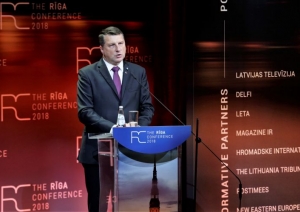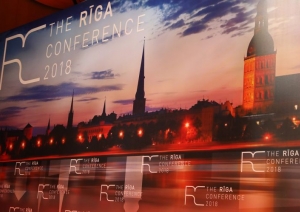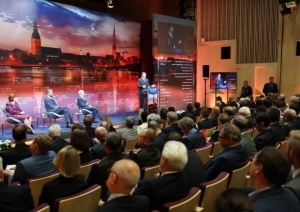Latvia’s century has not been an easy one. Independence was declared at a time when foreign troops were occupying our land. The first task of the new Latvia was to liberate our country from Bolshevik and German imperialists. There were no Latvian Armed Forces, and in 1918 people were sick of war.
Yet the cause of freedom was so strong that by 1920 a force of some 50,000 had cleared our land of enemies and in August a peace treaty was signed with the Soviet Union.
In January 1921 Aristide Briand, the Prime Minister of France and the President of the Inter-Allied Conference, signed a note regarding the recognition of Latvia de jure.
The War of Independence might have lasted much longer if not for the help of our friends. In particular Estonia, France, Poland, and the United Kingdom helped militarily while others gave non-military assistance.
After the horrors of the First World War Europe felt safe again. Latvia chose a position of neutrality, perhaps ignoring the lessons of the War of Independence. The consequences are well known to us all: half of our 100 years were spent under Soviet, then Nazi, then again Soviet occupation.
We have learned this lesson of history. That is why, when we regained independence in 1991, our main foreign policy objective was membership of the European Union and NATO.
Twice in the last century, together with America, Europe has defeated the tyrannies of imperialism, fascism, and communism. So, at this Baltic Centenary, let us look more closely at the central importance of Atlanticism to our security.
When we found ourselves left behind the Iron Curtain, the importance of the Sumner Welles declaration of 1940 became clear. At that time, America was still unwilling to become engaged in Europe’s latest war.
But America, and many others, refused to recognize the annexation of the Baltic States by the Soviet Union. This was a lifeline which helped to keep the hopes of independence alive for half a century.
More recently many American presidents have played a huge role in the Baltic region. Ronald Reagan’s principled stand against communism turned hopes of independence into a realistic possibility.
This was realised under George H.W. Bush. Bill Clinton’s personal relationship with Yeltsin helped the withdrawal of Russian troops from the Baltic States in 1993 and 1994. Clinton also resisted the marking of red lines as far as NATO enlargement to former Soviet states was concerned. In 1998 he signed the US – Baltic Strategic Partnership. Later, the wholehearted support of George W. Bush was key to the Baltic States becoming members of NATO.
The hopes of those who thought that membership of NATO and the EU alone would guarantee long-term security proved short-lived. While in economic terms we may be quite comfortable, wars in Georgia, Ukraine, and Syria have shown that the world is a dangerous place.
Moreover, ours is a dangerous neighbourhood where intensified hybrid threats have been added to traditional military ones. Recent elections in some European countries have shown that western democracies and the values on which they are based are under threat.
When even serious commentators are writing that “the democratic alliance that has been the bedrock of the American-led liberal world order is unravelling” it is fair to ask if we can still count on NATO and on the EU.
Let me turn to NATO first. Europe in general has seen a gradual decline in the importance placed on security. Successive US presidents have drawn attention to inadequate defence spending.
The result is that we find it hard to deal with problems such as the conflicts on our doorstep in the Middle East. We even seem to be blind to the dangers at our heart in the Western Balkans where recently US help was needed to stop the biggest blood-letting in Europe since 1945.
The conclusion seems to be that NATO requires constant care, especially from the US. Yet Barack Obama’s famous pivot along with unenforced red lines in Syria, and then Donald Trump’s aggressive rhetoric in Brussels, suggest this may no longer be taken for granted.
Yet, I do not agree with the pessimists. Let us look at the facts. Following the shock of Russian action in Crimea and the Donbas, the Obama administration moved swiftly to provide much-needed reassurance to the Baltic States.
This was quickly followed by decisive action at the Warsaw Summit resulting in NATO’s enhanced Forward Presence – a lesson in deterrence.
Since coming to power the Trump administration has followed through on Warsaw decisions. It has been forthright in demanding that European allies pull their weight. Europeans have realised that we must take our defence more seriously. Most of all, President Trump has given as clear a statement in support of Article 5 as it is possible to do.
In recent months I have met with many US officials and legislators. The wholehearted American bi-partisan support for Baltic security is unquestionable. The reality is that we are now more secure than we were 2 years ago.
As far as the EU is concerned, we have a number of serious challenges – as has always been the case. Yet Brexit has not led to the break-up of the bloc, rather the reverse. Despite the rise of populist and nationalist movements, Europe remains democratic. Of course, staying together is not easy, we have to work at it.
Celebrating this Baltic century, we celebrate independence, freedom and our common values. People often ask: what are these so-called shared, Western values? Well, I have spoken much about Americans, so I will end with a truly outstanding American. In his farewell to the American people, Senator John McCain wrote of his “heartfelt faith in Americans”. I share that faith.
He also wrote of his sublime happiness “to be connected to America’s causes – liberty, equal justice, respect for the dignity of all people”. These are American values; these are European values; these are Latvian values; these are our values. Together, we must do all we can to maintain and protect them.
Thank you!







